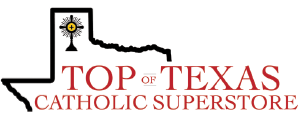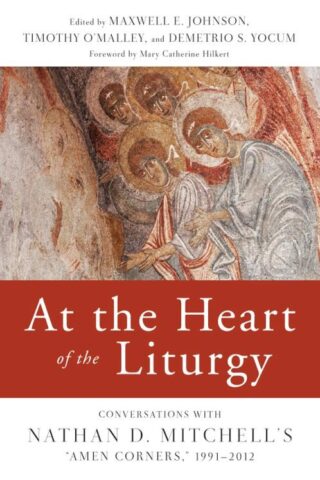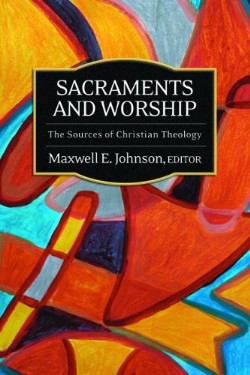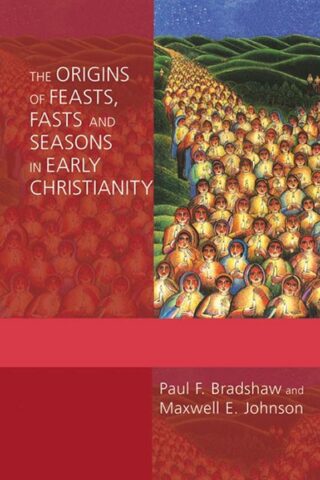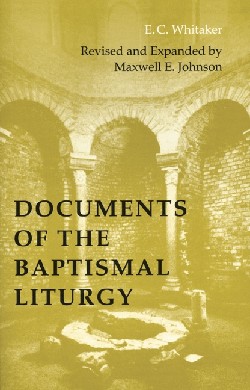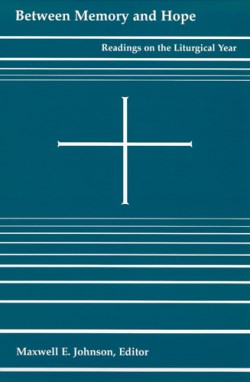Maxwell Johnson
Showing all 5 resultsSorted by latest
-
At The Heart Of The Liturgy
$34.95Add to cartFrom 1991 to 2012, Nathan D. Mitchell was the author of the “Amen Corner” that appeared at the end of each issue of Worship. Readers of Worship grew accustomed to Nathan’s columns as invitations to rethink the practice of Christian worship through a liturgical theology that was interdisciplinary, aesthetic, and attentive to history. With the soul of a poet, Nathan was always on the lookout for the turn of phrase, the image, stanza, or metaphor from other classic wordsmiths that could capture the liturgical insight he wanted to explore.For the first time, this volume assembles some of the most important of these columns around the themes of body, Word, Spirit, beauty, justice, and unity. In addition, Nathan’s former students offer substantive commentary through essays that invite the reader to consider how the themes raised by Nathan might develop in the coming years.This collection is a must-read both for those who admired Nathan’s contribution to liturgical studies and for a newer generation of scholars seeking to discern the frontiers of liturgical theology.Nathan D. Mitchell is an emeritus professor of liturgy in the Department of Theology at the University of Notre Dame. In 1998, Mitchell was presented with the Berakah Award from the North American Academy of Liturgy for his contribution to the field. His many publications include the following books: Cult and Controversy; Eucharist as a Sacrament of Initiation; Liturgy and the Social Sciences; Real Presence: The Work of Eucharist; and, more recently, Meeting Mystery and The Mystery of the Rosary: Marian Devotion and the Reinvention of Catholicism.
-
Sacraments And Worship
$55.00Add to cartThe church’s development and use of sacraments has evolved in many ways from the days of the early church to the present. This sourcebook presents key theological texts that played a role in those movements. Johnson traces the history and theology of individual sacraments along with their liturgical context in the church’s worship, while contributing helpful background notes to give the reader the full breadth and depth of the church’s thought on these important topics. The book will be a useful resource to those studying the history of Christian worship and the development of the sacraments.
-
Origins Of Feasts Fasts And Seasons In Early Christianity
$34.95Add to cartThe liturgical year is a relatively modern invention. The term itself only came into use in the late sixteenth century. In antiquity, Christians did not view the various festivals and fasts that they experienced as a unified whole. Instead, the different seasons formed a number of completely unrelated cycles and tended to overlap and conflict with one another. In early Christianity, the fundamental cycle was that of the seven-day week. Taken over from Judaism by the first Christians, this was centered on Sunday rather than the sabbath. As the early Church established its identity, the days of the week set aside for fasting came to be different from those customary among the Jews. There also existed an annual cycle related to Easter.
Drawing upon the latest research, the authors track the development of the Church’s feasts, fasts, and seasons, including the sabbath and Sunday, Holy Week and Easter, Christmas and Epiphany, and the feasts of the Virgin Mary, the martyrs, and other saints.
-
Documents Of The Baptismal Liturgy (Revised)
$39.95Add to cartA brilliant collection of early liturgies that demonstrates how the rite of baptism evolved in the early church. The texts are classified geographically with chapters on the ante-Nicene church, Byzantium, Syria, Armenia, Rome, Milan, Spain, Africa, Gallican documents, the Sarum rite, and more.
-
Between Memory And Hope
$49.95Add to cartThis anthology surveys the development and theology of the liturgical year in the order of its historical evolution: “From Sabbath to Sunday”; “From Passover to Pascha” (Lent, Holy Week, Easter, and Pentecost); and “From Pascha to Parousia” (Epiphany, Christmas, and Advent). In addition, introductory essays on the meaning of the liturgical year and a short concluding section on the sanctoral cycle (“From Parousia to Persons”) are also provided. While written as a companion to standard works in the field, beginning with graduate students in liturgy and seminarians, this book is intended for all–pastors, liturgists, catechists, religious educatorsho seek to live according to the Church’s theology of time as it is reflected in its calendar of feasts and seasons.
